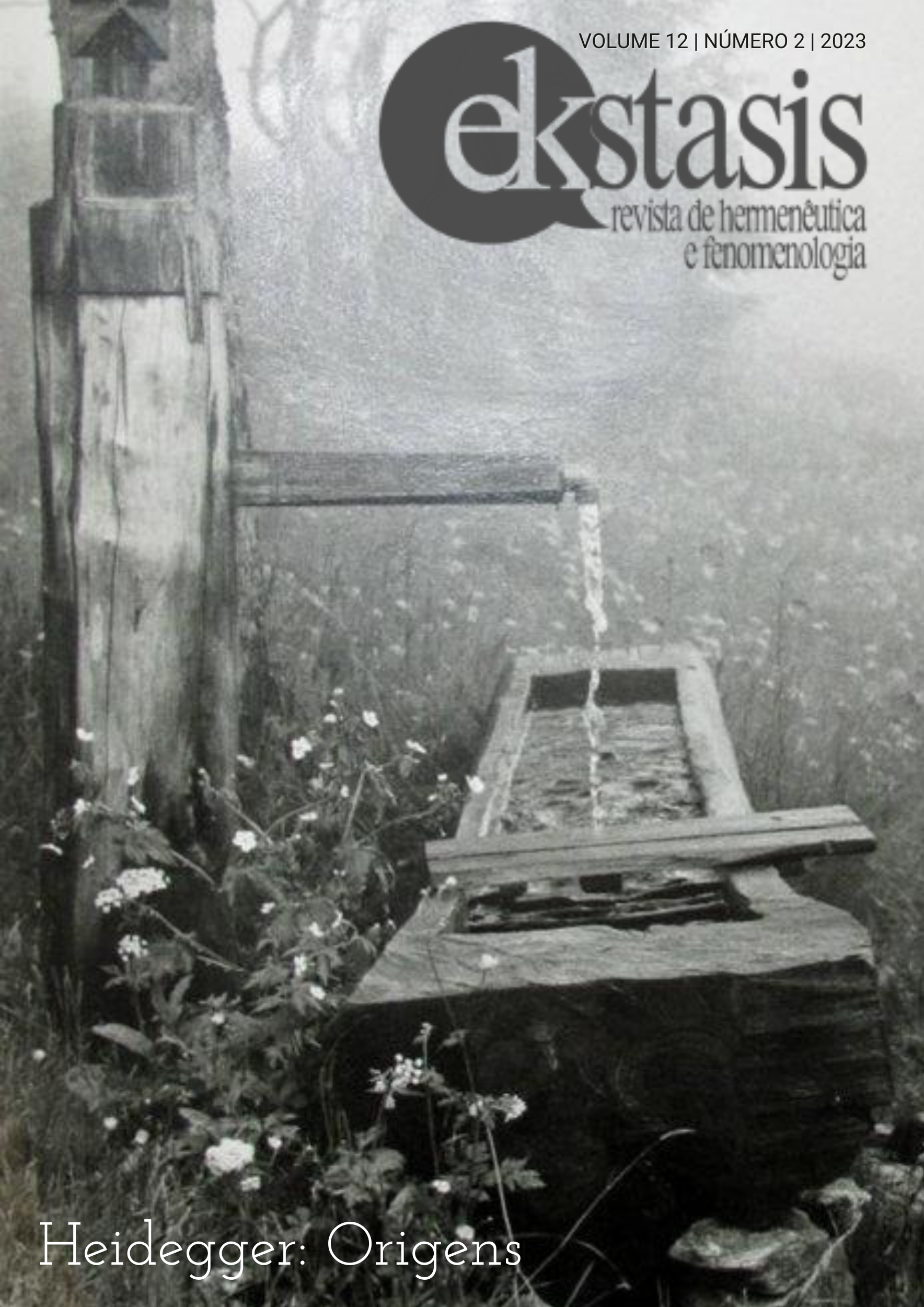O sentimento de ser
DOI:
https://doi.org/10.12957/ek.2023.81664Resumo
Trata-se da tradução do texto seminal de Matthew Ratcliffe The Feeling of Being (Journal of Consciousness Studies, 2005, 12 (8-10):43-60), cuja importância para áreas teóricas como a Filosofia das Emoções e a Filosofia da Psiquiatria, mas também para áreas práticas e aplicadas como a própria Psiquiatria, a Psicologia e as Ciências Médicas justifica-se a partir da apresentação e tematização inaugural da noção de sentimentos existenciais (existential feelings), aqui discutida à luz de resultados da fenomenologia, neurofisiologia e psicopatologia.
***
Recentemente tem havido uma série de discussões filosóficas sobre a relação entre emoção e sentimento. No entanto, em nossa fala cotidiana, “sentimento” não se restringe ao sentimento emocional, e a ênfase corrente sobre as emoções nos conduziu a uma negligência com relação a outros tipos de sentimento. Entre eles, estão os sentimentos de acolhimento, pertencimento, separação, não-familiaridade, poder, controle, ser parte de algo, estar em harmonia com a natureza e “estar presente”. Esses sentimentos talvez não sejam “emocionais”. Não obstante, sugiro aqui que eles formam um grupo distinto; todos esses sentimentos são modos nos quais “nos encontramos no mundo”. De fato, nosso senso de que existe um mundo e de que estamos “nele” é, sugiro, constituído por sentimento. Ofereço uma análise do que são esses “sentimentos existenciais”, mostrando como eles podem ser tanto “sentimentos corporais” quanto, ao mesmo tempo, parte da estrutura da intencionalidade.
Downloads
Referências
BEN-ZE’EV. A. ‘Emotion as a subtle mental mode’, in Solomon: 2004.
DAMASIO, A., Descartes Error: Emotion, Reason and the Human Brain. London: Picador, 1995.
DAMASIO, A. Looking for Spinoza: Joy, Sorrow and the Feeling Brain. London: Heinemann, 2003.
DRUMMOND, J. ‘“Cognitive impenetrability” and the complex intentionality of the emotions’, Journal of Consciousness Studies, 11 (10–11), p. 109–26, 2004.
GALLAGHER, S. How the Body Shapes the Mind. Oxford: Clarendon Press, 2005.
GERRANS, P. ‘Refining the explanation of Cotard’s Delusion’, in Pathologies of Belief, ed. M. Coltheart. & M. Davies. Oxford: Blackwell, 2000.
GLAS, G. ‘Anxiety: Animal reactions and the embodiment of meaning’, in Nature and Narrative: An Introduction to the New Philosophy of Psychiatry, ed. B. Fulford, K. Morris, J. Sadler & G. Stanghellini. Oxford: Oxford University Press, 2003.
GOLDIE, P. The Emotions: A Philosophical Exploration. Oxford: Clarendon Press, 2000.
GOLDIE, P. ‘Emotions, feelings and intentionality’, Phenomenology and the Cognitive Sciences, 1, pp. 235–54, 2002.
GREENSPAN, P. ‘Emotions, rationality, and mind / body’, in Solomon, 2004.
HEIDEGGER, M. Being and Time, trans. J. Macquarrie and E. Robinson. Oxford: Blackwell, 1962.
HEIDEGGER, M. Being and Time, trans. J. Stambaugh. New York: State University of New York Press, 1996.
HEIDEGGER, M. ‘What is metaphysics?’, in his Basic Writings, ed. and trans. D.F. Krell. London: Routledge, 1978
HOBSON, P. The Cradle of Thought: Exploring the Origins of Thinking. London: Macmillan, 2002.
HOOKWAY, C. ‘Emotions and epistemic evaluations’, in The Cognitive Basis of Science, ed. P. Carruthers, S. Stich & M. Siegal. Cambridge: Cambridge University Press, 2002.
JAMES, W. ‘What is an emotion?’, Mind, 9, pp. 188–205, 1884.
JAMES, W. The Varieties of Religious Experience: A Study in Human Nature. New York: Longmans, Green and Co., 1902.
JAMES, W. The Will to Believe and Other Essays in Popular Philosophy. New York: Dover Publications, 1956.
JAMES, W. Pragmatism. Indianapolis: Hackett, 1981.
MAHER, B. ‘Anomalous experience in everyday life: Its significance for psychopathology’, The Monist, 82, pp. 547–70, 1999.
MERLEAU-PONTY, M. Phenomenology of Perception, trans. Smith, C. London: Routledge, 1962.
NUSSBAUM, M. Upheavals of Thought: The Intelligence of Emotions. Cambridge: Cambridge University Press, 2001.
RATCLIFFE, M. ‘Heidegger’s attunement and the neuropsychology of emotion’, Phenomenology and the Cognitive Sciences, 1, pp. 287–312, 2002.
RATCLIFFE, M. ‘Interpreting delusions’, Phenomenology and the Cognitive Sciences, 3, pp. 25–48, 2004.
RATCLIFFE, M. ‘William James on emotion and intentionality’, International Journal of Philosophical Studies, 13, pp. 179–202, 2005.
RATCLIFFE, M. (in press), ‘Folk psychology and the biological basis of intersubjectivity’, in Philosophy, Biology and Life (Royal Institute of Philosophy Supplements), ed. A. O’Hear. Cambridge: Cambridge University Press.
SARTRE, J.P. Being and Nothingness, trans. H.E. Barnes. London: Routledge, 1989.
SASS, L., The Paradoxes of Delusion: Wittgenstein, Schreber, and the Schizophrenic Mind. Ithaca: Cornell University Press, 1994.
SASS, L. ‘Affectivity in Schizophrenia: A Phenomenological View’, Journal of Consciousness Studies, 11 (10–11), pp. 127–47, 2004.
SCHREBER, D.P. Memoirs of my Nervous Illness. New York: New York Review of Books, 2000.
SOLOMON, R. The Passions: Emotions and the Meaning of Life. Indianapolis: Hackett, 1993.
SOLOMON, R. Not Passion’s Slave: Emotions and Choice. Oxford: Oxford University Press, 2003.
SOLOMON, R. ed. Thinking about Feeling: Contemporary Philosophers on Emotions. Oxford: Oxford University Press, 2004.
STANGHELLINI, G. Disembodied Spirits and Deanimated Bodies: The Psychopathology of Common Sense. Oxford: Oxford University Press, 2004.
STONE, T. & Young, A ‘Delusion and brain injury: The philosophy and psychology of belief’, Mind & Language, 12, pp. 327–64, 1997.
VAN FRAASSEN, B. The Empirical Stance. New Haven: Yale University Press, 2002.
YOUNG, A. & LEAFHEAD, K. ‘Betwixt life and death: Case studies in the Cotard Delusion’, in Method in Madness: Case Studies in Cognitive Neuropsychiatry, ed. P. Halligan & J. Marshall. Hove: Psychology Press, 1996.


